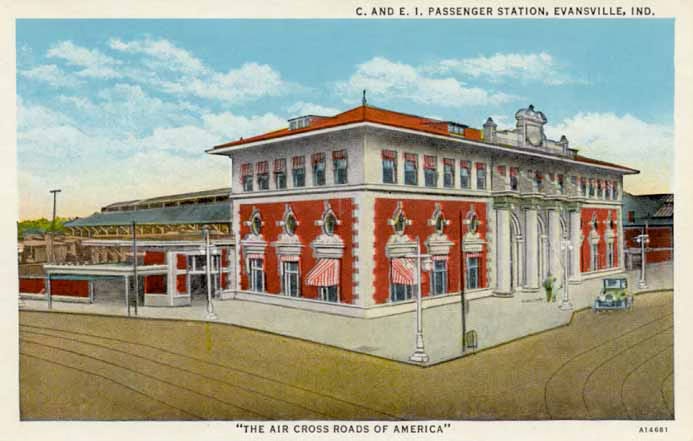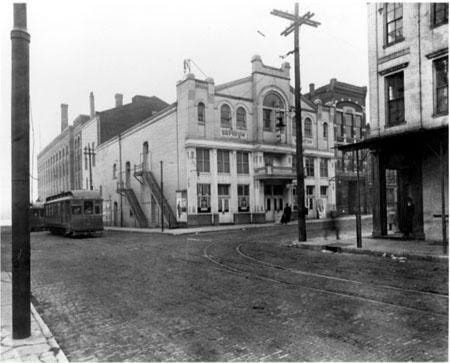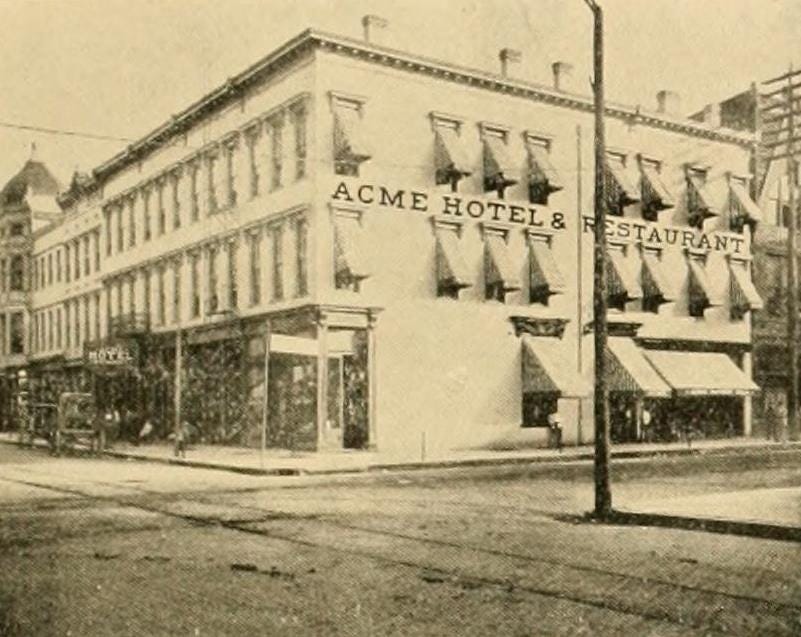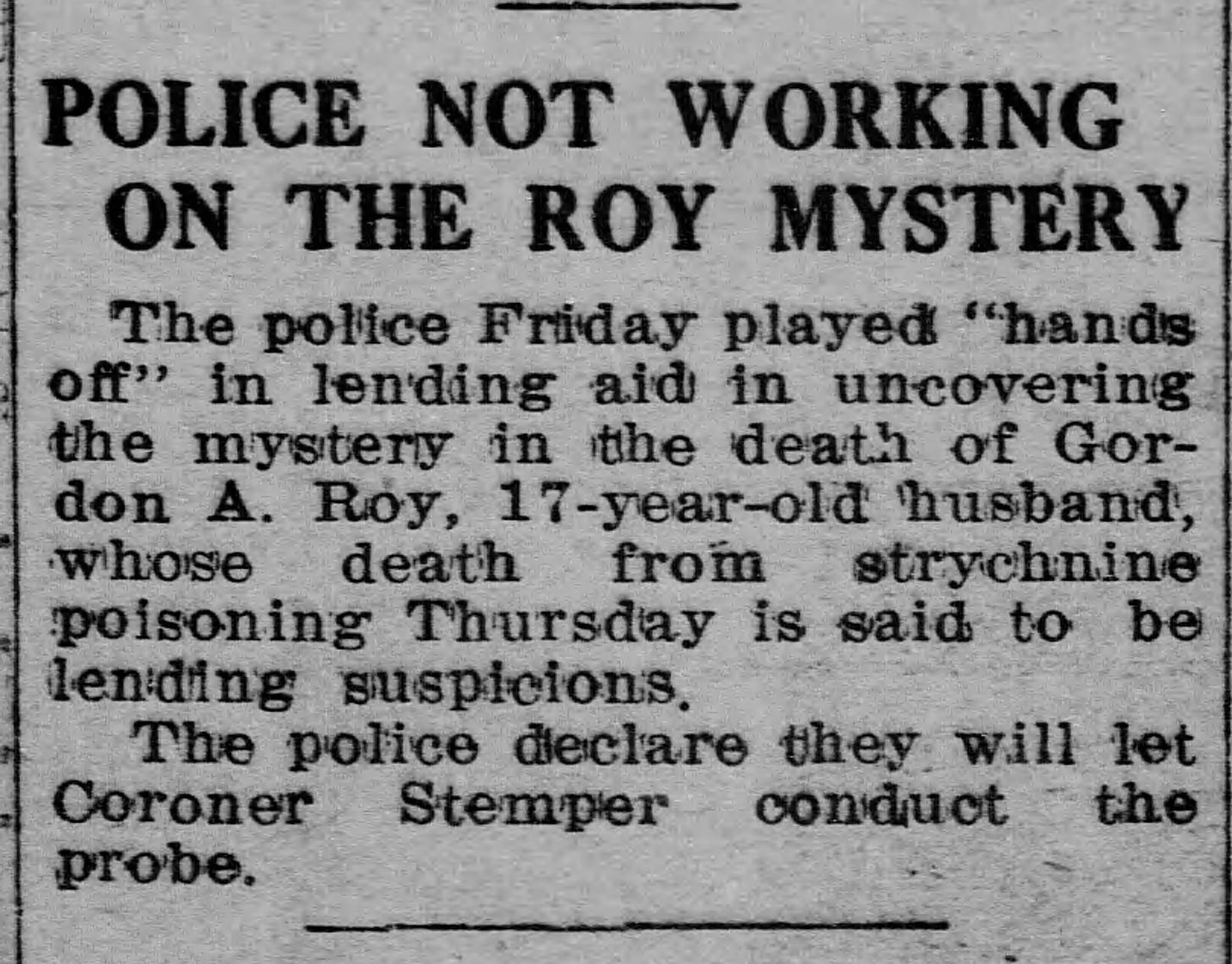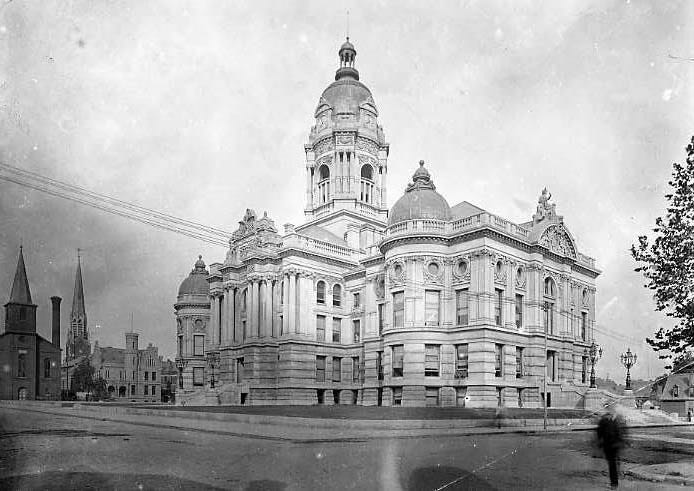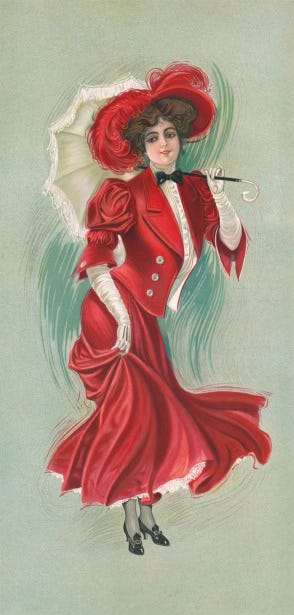Coroner Stemper searched Gordon and Mildred’s room, collecting everything he thought might be important and carted it back to his office. The packet of Mildred’s letters that Gordon had kept revealed much of went on during the time the young bride was back at her family home in Grayville.
In the letter from August 2, 1913, Mildred complains about staying with her family which was supposed to continue until August 24 when it had been arranged for Gordon to come for her. Since he was paid once a month by the railroad, it’s likely this is because he would have been paid by then and could secure a new room for the couple.
In that letter, Mildred writes about the town she’d lived in until only a few short months before, “This is the loneliest, dirtiest place in the world. If I had to spend another week in this God-forsaken place, I’ll run off. No. I’ve waited for three months for us to come to some understanding and seems like you don’t seem to do anything for me but promise and hold me off. I can’t live 24 days without a cent and me needing stockings and shoes. Poor old dad is out of work and I can’t expect him to clothe me. He is doing damn well to feed me.”
The letter that must have caused Gordon so much heartache didn’t stop there, “Don’t blame it on me. Why didn’t you get a job that pays by the week like other young men do. I never heard of men getting paid by the month, besides, where’s that $40 you said your mother sent you?” It doesn’t seem to have occurred to Mildred that it was used to pay for rent, food, and a trip to the Orpheum theater.
The August 7 letter from Mildred is much kinder and softer. Maybe she felt bad about her previous, scathing letter and was trying to make up for it. She said she was just blue and lonesome, that she still loved Gordon, and just wanted him to come get her. She said she didn’t realize just how much she loved him until she was alone. There were many other quotes from supposed letters from Mildred but they are significantly more wordy and melodramatic, not in the girlish manner of the other letters, so I’m not sure if those words were from her or not.
Something else Coroner Stemper found was an unmailed letter from Gordon to his mother, Rosa. Its contents were not made public. Something else was discovered on the back of that letter. If this is accurate, it is particularly stunning that on the back of the letter to his mother was written, “I, the undersigned party, the legal wife of Gordon A. Roy, do hereby wish a divorce from him. Reasons why — He is not the man I took him to be and he won’t support me. Signed, MILD.” I can’t imagine the pain Rosa must have felt when she learned about this, and learn about it she did.
Another note written by Gordon was found. It appeared to be a suicide note and took quite a bit of time and ingenuity to read. While collecting items from the room, Coroner Stemper saw torn pieces of paper scattered across the bed and floor. He collected the pieces, which were later reassembled. The note had been written on stationery from the Acme Hotel which was situated on NW 2nd Street at the time. Gordon may have stayed there while Mildred was back in Grayville. It read:
“Dear Sir: To whom may find my body. I myself done this horrible crime by taking poison. Please notify my mother at 1219 Church Street, Nashville, Tennessee. Her name is Rosa Lee Roy. I have an uncle at 1013 East Michigan street or East Indiana street here. It was because of love that I did this. Mildred, please forgive me and go to the man you love. Please do better by him than you did by me. Good-by. GORDON A. ROY”
Questions were asked about who actually wrote the note. It was shown to Andrew who said he couldn’t be sure. He said Gordon’s handwriting was typically better than that but he couldn’t help but think his nephew would have been in great distress at the time which may have affected his penmanship.
Andrew provided the Coroner with a piece of sheet music from his home on which Gordon had written “Gordon’s favorite.” Those who compared the note to the known sample said the letters didn’t appear to be made by the same person, but they couldn’t be sure.
For those wondering why the Coroner was conducting this inquiry and where the heck are the police…well, in a peculiar response to publicity and questions from the Roy family, the response of the Evansville police department was printed in the newspaper. The police stated they were “hands off” in investigating Roy’s death, saying they were leaving it up to the Coroner. One wonders if this had anything to do with Mildred’s family consisting of a Mayor, a physician, a lawyer, and a St. Louis Judge. It wouldn’t be unusual that law enforcement actions were influenced by the status of a family.
The Coroner added to the record that, in addition to the notes and letters he had found, he also recovered a bottle of strychnine from the room.
Gordon’s body was taken to the Joseph & Edward Schaefer Morgue on Lower 5th Street. Andrew took Mildred with him to the morgue where she gave her permission for him to identify and give instructions for the body of his nephew. Andrew identified Gordon’s body while Mildred paced the room, twice refusing to look at the body saying it would “destroy my mind.” Andrew could not have had an easy time of it, seeing this happen to his young nephew even after he’d tried his best to prevent the marriage. Mildred returned to her sister Nellie’s house afterward.
Mortician Ed Schaefer spoke with an undertaker in Nashville who asked the body be prepared and sent to Nashville where it would be buried in Mt. Olivet Cemetery. It was made crystal clear that Gordon’s mother would not be coming to Evansville.
There was an inquest on Friday, August 16. Andrew was present as was Mildred who was supposed to be accompanied by her parents and her uncle, Mayor Claude Ellis. It isn’t clear if they made it to Evansville in time.
Coroner Stemper questioned Mildred and asked her to recount the events of the day and night of August 13 and the morning of August 14. She repeated her story with a seemingly clearer head than she had when speaking with the journalists the day before.
Mildred said Wednesday morning Gordon left for his job saying he could work until about 11:00 a.m. but he was home by 9:30, head in his hands, saying he was sick. She testified that this was when he showed her the suicide note saying, “Here, hun, read that.” She said she tore it up.
The two had argued when Gordon returned home early from work. She stated she had seen him mix some white powder in a glass of water but didn’t ask what is was. She said she figured he’d taken some of her talcum face powder and mixed it up. She didn’t give an explanation for why she thought this. That’s when she went downstairs to play the piano for half an hour.
When she went back to the room, she saw white powder on a table, a pool of chalky liquid in the bottom of the drinking glass, and a residue of white powder on the rim. Gordon was lying on the bed, moaning. Mildred asked when he was going to get the cerise coat suit he promised her. He said the next day.
She asked if he wanted a doctor, but he said no. She said, “That’s when I knew he was fooling.” But then later, Gordon did ask for a doctor. Mildred asked Mrs. Schneider to call a doctor for him. Gordon didn’t go down for lunch, or want any food, only lots of water. Mildred ate lunch, left the house, and did not return until night time. Because she’d gone, Mildred wasn’t there with the doctor came.
When Mildred got back to the boarding house later that night, Gordon was writhing around on the bed. When she spoke to him, he replied with nonsensical things like, “Boys, call me early, you know I’ve got to leave.” He would intermittently become lucid. During one of those times, he told her the doctor said he had constricted bowels.
Mildred was asked why she left the boarding house at 4:00 a.m. knowing Gordon was very ill. Her reply was that she thought Gordon was going to be taken to the hospital and since she didn’t have any money to stay in the rented room, she left to find other lodgings. Why did she think this, because the doctor wasn’t called back until 6:00 a.m. and even then it was by the action of Mrs. Schneider who checked on Gordon and saw his worsened condition. According to Mildred, she’d been gone for two hours by then. Also, if she thought the room would be vacated, why didn’t she take her belongings with her?
I’m not trying to accuse Mildred of something dastardly, but it does show her inability to grasp that this was a dire situation and her obliviousness to what could happen, to what was going to happen. Her attention was so firmly fixated on herself that she missed all the signs of a tragedy brewing.
When specifically asked to explain how the suicide note came to be torn up, Mildred now replied that Gordon told her to tear it up, which isn’t what she said before. She repeated that he had previously threatened suicide and she didn’t believe he would do it. Mildred put the time this happened between 1:00 and 4:00 a.m. and said she left the room at 4:00 a.m. to go to her sister Nellie’s house. When questioned separately, Nellie said Mildred didn’t arrive until after 6:00 a.m. To walk from the location of the boarding house to Nellie’s house would have been 8-9 blocks, but it certainly would not have taken two hours, and at 4:00 a.m., I wouldn’t expect Mildred to dawdle around the quiet, empty streets.
This sounds like it could be a jumbling of information through many people, retellings, and newspaper reporting. My impression, largely because of Nellie’s testimony is that Mildred thought Gordon was going to the hospital because she didn’t leave until around 6:00 a.m. when his condition had worsened enough to warrant calling the doctor again. This would explain why she thought she wouldn’t be able to stay there any longer and the fact that she left without her suitcase is probably also attributable to her inattention to anything outside the sphere of her immediate needs and wants.
Dr. Cain testified that he had indeed told the Coroner there was no sign of poisoning when he saw Gordon the evening of the 13th. He said he was called again the next morning and when he arrived at 6:30 a.m., he found Gordon dead. Dr. Cain stated that poison was definitely a consideration and in his opinion, the boy should not have died so quickly from the affliction he had the night before. That may or may not be true. It seems likely Gordon’s symptoms were the early manifestations of taking a low-to-medium- dose of strychnine and without sufficient information to even consider that option, Dr. Cain decided on the bowel problem.
During the inquest, a deposition signed by Mildred was produced where she admitted to the Coroner she had been unfaithful to Gordon. It also stated she believed he had committed suicide because of her unfaithfulness and because he was having trouble financially supporting her. There was no indication in the public statements that Mildred objected to this statement or tried to object during the inquest.
Andrew Roy testified he was now satisfied that his nephew had written the suicide note. He added that Gordon had his monthly check for $30 waiting from the railroad but had been too ill to pick it up.
Coroner Stemper delivered his verdict. Mode of Death by suicide and Method by strychnine poisoning.
The death certificate lists Gordon’s profession as a soda fountain clerk. He did have money coming from the railroad when he died, but he may have picked up another job in attempts to support himself and Mildred. The death certificate is the only mention of this particular job.
In response to this came the opinions of Gordon’s family, both maternal and paternal sides were considerable land-holding and business families in Tennessee. But it was Tennessee, hours away.
On August 16, the Chattanooga News reported that the Roy family rejected the suicide verdict, believed their family member had been murdered by his new wife, and requested a thorough investigation into the circumstances of Gordon’s death. This was also reported in The Tennessean on August 17. If anything came of this, it changed nothing.
On August 19, Mayor Ellis of Grayville came to Evansville to ‘defend the character’ of his niece. I don’t know who he declared this to, but he adamantly insisted that Mildred had not told Coroner Stemper she had been intimate with other men and that her signature on such a document had been obtained while the paper was completely blank. Mayor Ellis demanded amends be made by those who had maligned her, saying Gordon’s death had been the result of Mildred’s “misdoings.” Likewise, this also came to nothing.
On August 23, Rosa Roy did travel to Evansville bearing legal paperwork which Coroner Stemper signed. The documents allowed her to collect the insurance money from a policy the family had for him.
Even though Mildred told the press she was going to stay in Evansville and find work, she returned to her family in Grayville. By 1916, she was living in Indianapolis where her sister Nellie was then living. Mildred worked in a cotton mill there and is documented as a knitter in 1916.
After a two-day bout with pneumonia, Mildred Ellis Roy died at age 23 on May 9, 1918, one day after her five-year anniversary of marriage to Gordon Roy. Nellie lived to be 96, passing away in 1986.
I have not discovered what happened to Gordon’s mother after 1917 other than a few land purchases and sales in Nashville. She may have married again, moved away, or passed away. Gordon will remain the boy described as, “Tall, slim, with curly brown hair, and brown eyes, ‘the kind romantic girls love.’”




